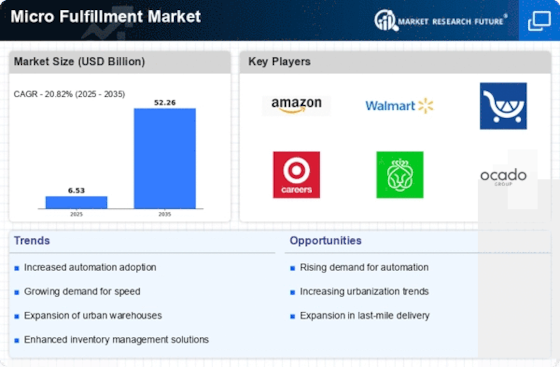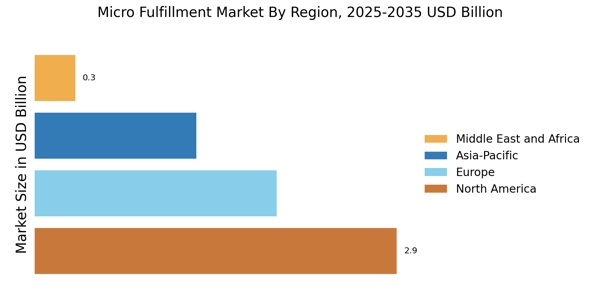Technological Advancements in Logistics
Technological innovations are playing a pivotal role in shaping the Micro Fulfillment Market. The integration of advanced technologies such as artificial intelligence, robotics, and the Internet of Things is streamlining logistics operations. These technologies enable retailers to optimize inventory management, enhance order accuracy, and improve overall efficiency in micro fulfillment centers. For instance, AI-driven analytics can predict consumer demand patterns, allowing businesses to adjust their inventory levels accordingly. Furthermore, the use of robotics in picking and packing processes significantly reduces labor costs and increases throughput. As these technologies continue to evolve, they are expected to drive further growth in the micro fulfillment sector, making it more attractive for retailers seeking to enhance their operational capabilities.
Evolving Retail Landscape and Competition
The Micro Fulfillment Market is witnessing a transformation in the retail landscape, characterized by heightened competition among traditional retailers and e-commerce platforms. As consumers increasingly turn to online shopping, retailers are compelled to innovate and adapt their fulfillment strategies. The rise of direct-to-consumer models and subscription services has further intensified this competition, prompting businesses to explore micro fulfillment as a viable solution. By leveraging micro fulfillment centers, retailers can offer faster delivery options and personalized services, which are becoming essential in attracting and retaining customers. This competitive pressure is likely to drive investments in micro fulfillment technologies and infrastructure, as companies strive to differentiate themselves in a crowded marketplace.
Focus on Cost Efficiency and Profitability
Cost efficiency is a critical driver in the Micro Fulfillment Market, as retailers seek to optimize their operations and enhance profitability. Micro fulfillment centers, which are smaller and more strategically located than traditional warehouses, can significantly reduce operational costs associated with inventory storage and order fulfillment. By minimizing the distance between fulfillment centers and consumers, retailers can lower transportation costs and improve delivery times. Recent studies suggest that businesses adopting micro fulfillment strategies can achieve up to a 30% reduction in logistics costs. This focus on cost efficiency not only improves profit margins but also enables retailers to offer competitive pricing to consumers, thereby fostering customer loyalty and driving sales growth.
Rising Urbanization and Population Density
The Micro Fulfillment Market is significantly influenced by the ongoing trend of urbanization and increasing population density in metropolitan areas. As more people move to cities, the demand for convenient shopping options rises, prompting retailers to establish micro fulfillment centers in urban locations. This strategic positioning allows retailers to cater to a larger customer base while minimizing delivery times. Data indicates that urban areas are projected to account for over 80% of global GDP by 2025, underscoring the economic importance of these regions. Consequently, retailers are likely to invest in micro fulfillment solutions to capitalize on the growing urban consumer market, thereby enhancing their service offerings and operational efficiency.
Increased Consumer Demand for Fast Delivery
The Micro Fulfillment Market is experiencing a notable surge in consumer demand for rapid delivery services. As e-commerce continues to expand, customers increasingly expect their orders to arrive within hours rather than days. This shift in consumer behavior is prompting retailers to adopt micro fulfillment strategies, which allow for quicker order processing and delivery. According to recent data, nearly 70% of consumers express a preference for same-day delivery options. This trend is driving investments in micro fulfillment centers, which are strategically located closer to urban areas, thereby reducing delivery times and enhancing customer satisfaction. Retailers that effectively implement micro fulfillment solutions are likely to gain a competitive edge in the market, as they can meet the evolving expectations of consumers who prioritize speed and convenience.

















